- Clone
- W15200A (See other available formats)
- Regulatory Status
- RUO
- Other Names
- Cyclin-dependent kinase 4, Cell division protein kinase 4, PSK-J3
- Isotype
- Rat IgG2a, κ
- Ave. Rating
- Submit a Review
- Product Citations
- publications
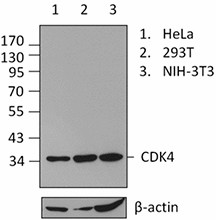
-

Total cell lysate from human HeLa cells (lane 1), 293T cells (lane 2), and NIH-3T3 cells (lane 3) were resolved by electrophoresis, transferred to nitrocellulose, and probed with purified anti-CDK4 (clone W15200A) antibody. Proteins were visualized using an HRP goat anti-rat IgG antibody and chemiluminescence detection. Purified anti-β-actin (clone Poly6221) antibody was used as a loading control.
Cyclin-Dependent Kinase 4 (CDK4) is a member of the Ser/Thr protein kinase family. It functions as the catalytic subunit of the cyclin D-CDK4 (DC) complex that is important for cell cycle progression through the G1 phase. The DC complexes accumulate on the nuclear membrane and are transported to the nucleus when cells enter S phase. In the nucleus, DC complexes phosphorylate and inhibit the retinoblastoma (Rb) proteins. Phosphorylation of Rb protein results in dissociation of the transcription factor E2F from the Rb/E2F complex and activation of E2F target genes. This process is controlled by D-type cyclins and CDK inhibitor p16 (CDK4I). Formation of the ternary complex, cyclin D/CDK4/CDKN1B, is required for nuclear translocation and DC complex activity. Mutations of CDK4 gene have been found to be associated with the tumorigenesis of many cancers such as cutaneous malignant melanoma.
Product DetailsProduct Details
- Verified Reactivity
- Human, Mouse
- Antibody Type
- Monoclonal
- Host Species
- Rat
- Immunogen
- Full length human CDK4 recombinant protein expressed in E. coli.
- Formulation
- Phosphate-buffered solution, pH 7.2, containing 0.09% sodium azide.
- Preparation
- The antibody was purified by affinity chromatography.
- Concentration
- 0.5 mg/ml
- Storage & Handling
- The antibody solution should be stored undiluted between 2°C and 8°C.
- Application
-
WB - Quality tested
- Recommended Usage
-
Each lot of this antibody is quality control tested by Western blotting. For Western blotting, the suggested use of this reagent is 0.5 - 2.0 µg per ml. It is recommended that the reagent be titrated for optimal performance for each application.
- RRID
-
AB_2629825 (BioLegend Cat. No. 690802)
Antigen Details
- Structure
- 303 amino acids with a predicted molecular weight of 33.7 kD. Contains a Ser/Thr protein kinase domain.
- Distribution
- Cytoplasm when non-clomplexed, nucleus, and nuclear membrane.
- Function
- CDK4 is a Ser/Thr kinase and is a component of D-CDK4 complex that regulates cell cycle progression during G1/S transition.
- Interaction
- Forms a complex with the D-type G1 cyclins CND1, CCND2, and CCND3. Interacts with SEI1, ZNF655, CDKN1A, CDNN1B, CDKN2A, and CEBPA.
- Biology Area
- Cell Biology, Cell Cycle/DNA Replication
- Molecular Family
- Protein Kinases/Phosphatase
- Antigen References
-
1. O'Leary B, et al. 2016. Nat. Rev. Clin. Oncol. 13:417.
2. Jirawatnotai S, et al. 2014. Cell Cycle 13:2889.
3. Lee Y, et al. 2014. Nature 510:547.
4. Sheppard KE, McArthur GA. 2013. Clin. Cancer Res. 19:5320.
5. Wang C, et al. 2011. Cell Cycle 10:57.
6. Paternot S. 2010. Cell Cycle 9:689. - Gene ID
- 1019 View all products for this Gene ID
- UniProt
- View information about CDK4 on UniProt.org
Related Pages & Pathways
Pages
Related FAQs
Other Formats
View All CDK4 Reagents Request Custom Conjugation| Description | Clone | Applications |
|---|---|---|
| Purified anti-CDK4 | W15200A | WB |
Customers Also Purchased
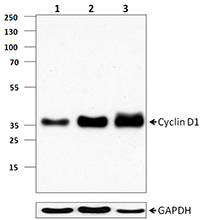
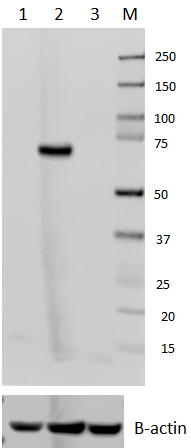
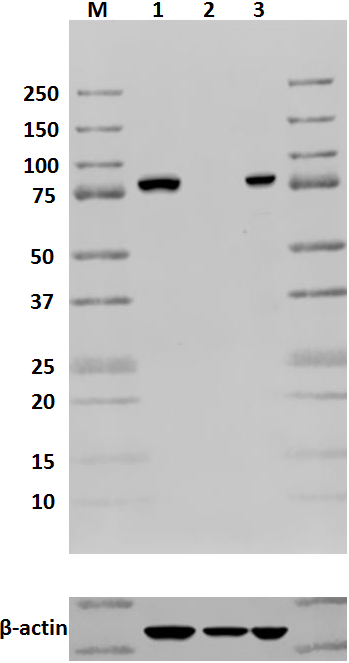
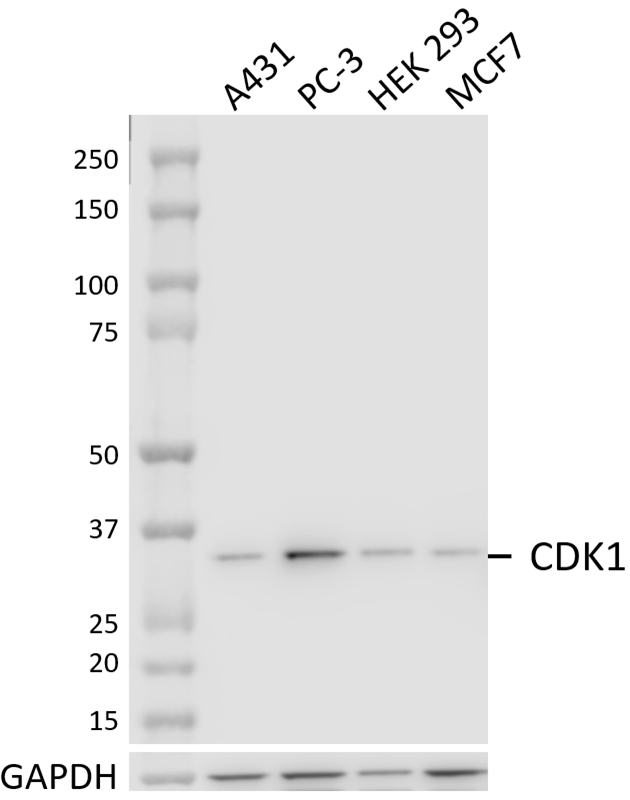
Compare Data Across All Formats
This data display is provided for general comparisons between formats.
Your actual data may vary due to variations in samples, target cells, instruments and their settings, staining conditions, and other factors.
If you need assistance with selecting the best format contact our expert technical support team.
-
Purified anti-CDK4
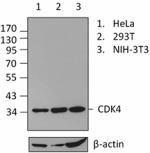
Total cell lysate from human HeLa cells (lane 1), 293T cells...








Follow Us